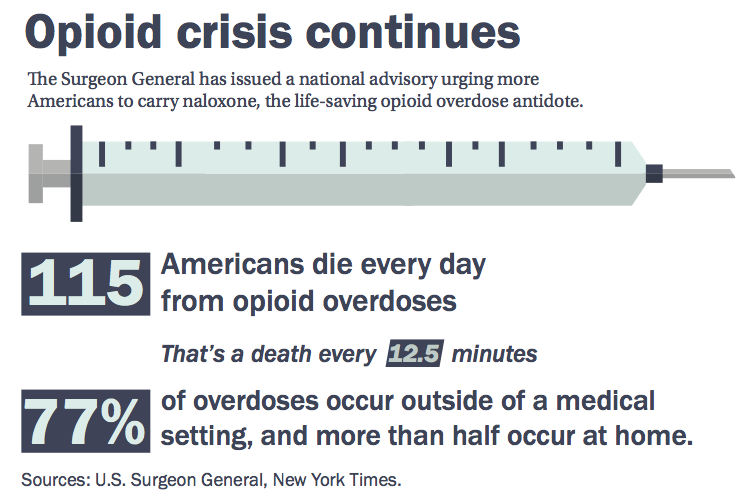The U.S. Surgeon General Jerome Adams released a public health advisory last week urging more Americans to carry the life-saving drug naloxone if they or others they know are at risk of an opioid overdose.
Naloxone, also commonly known by the brand name Narcan, reverses the side effect of an opioid overdose known as respiratory depression which affects breathing and can quickly lead to death, according to the World Health Organization. The drug comes in both nasal spray and syringe-injection forms.
In a statement accompanying the advisory, Adams said 115 Americans die every day from overdosing on opioids, and more than half of those deaths occur at home, which can make quick treatment much harder.
“To manage opioid addiction and prevent future overdoses, increased naloxone availability must occur in conjunction with expanded access to evidence-based treatment for opioid use disorder,” Adams said.
According to the advisory, individuals at the most risk of overdosing are those who misuse prescription opioids or illicit opioids such as heroin or fentanyl, those who have an opioid addiction, those who have been recently discharged from medical care for an overdose and those recently released from incarceration with a history of opioid misuse or addiction.
Naloxone can be prescribed by both doctors and pharmacists and is often handed out for free by community organizations. The cost of each dose can range from a few dollars for a vial and syringe of the drug to about $40 for the nasal spray when purchased in bulk. Students for Sensible Drug Policy is one of several groups that hands out free doses of naloxone to UT students. Naloxone is also carried by most first responders, such as police and EMTs and is kept in all dorms at UT.
“(The surgeon general’s announcement) is a great first step,” said Anand Pant, SSDP president and management information systems senior. “It’s kind of a wake-up call, saying not only is this happening to such a severe degree, but this is happening to the people around you.”
The UT College of Pharmacy’s Operation Naloxone initiative supports the use of the life-saving drug and trains people on how to properly administer it. Lucas Hill, a pharmacy professor and Operation Naloxone director, said he is glad to see the Trump administration is shifting toward reducing the danger faced by current opioid users.
“While the title refers to physicians, the message is a lot broader,” Hill said. “We’ve known from years of evidence that it’s most important for friends and family members, especially of people who are using illicit drugs, to have naloxone. The vast majority of reversals are going to be conducted by laypersons, not by first responders … (Adams) really focused on the right population.”
Previously, much of the Trump administration’s approach to the opioid epidemic has involved increasing law enforcement crackdowns on illicit opioid sales and regulating opioid prescriptions. But Hill said that approach often has the unintended effect of increasing sales of smaller and more potent synthetic opioids such as fentanyl, which increases the likelihood of overdosing.
“After a lot of disappointment regarding a lack of meaningful engagement around the issue from the administration, I feel like this statement from the surgeon general was pretty important,” Hill said.















